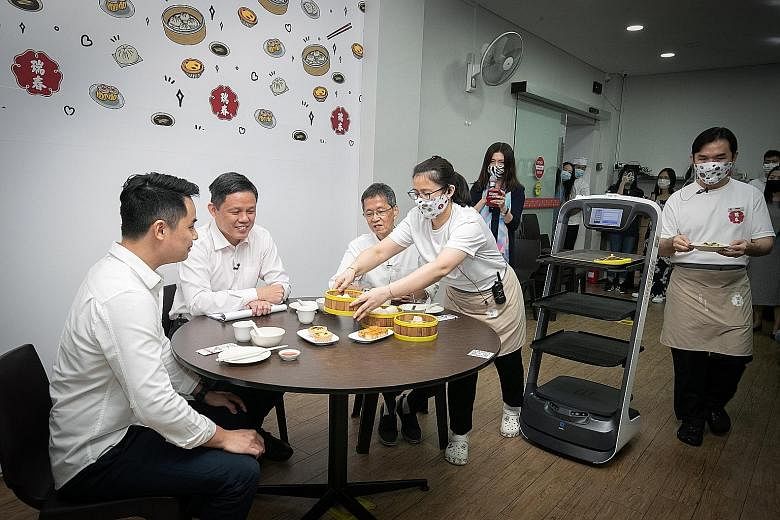The food and beverage (F&B) sector is on a path of steady recovery, with many companies seeing their revenues back to around 70 per cent to 80 per cent of pre-Covid-19 sales.
A big driver of this recovery is from companies that embraced digital adoption, Minister for Trade and Industry Chan Chun Sing said yesterday during a visit to Swee Choon Tim Sum Restaurant.
He noted that more restaurants and eateries have turned to selling food and beverages online even after Singapore lifted the circuit breaker in June.
Of the total industry sales in the food services sector, nearly 45 per cent was made online in May when the circuit breaker was in place - up from roughly 10 per cent in January. By September, about one in five sales was made online - higher than pre-circuit breaker levels.
The food services sector contributes about 1.1 per cent of Singapore's gross domestic product and employs about 5.5 per cent of the country's workforce.
"Covid-19 has accelerated digital adoption for many of our F&B companies," Mr Chan said yesterday. This is especially so for those in the Central Business District and tourism-related areas, as well as catering companies, all of which are seeing slower recovery, he added.
Mr Chan noted that from January to October, the number of applications for the Productivity Solutions Grant (PSG) in the F&B sector was more than four times that of the same period last year.
So far, more than 2,700 PSG applications for IT solutions have been approved this year.
Swee Choon is an example of an F&B company that adapted quickly during the circuit breaker by pivoting to food delivery services to minimise the impact of Covid-19 on its business, said the minister.
These efforts increased its sales from food delivery significantly, from less than 1 per cent before the circuit breaker to around 60 per cent of its average monthly revenue during the circuit breaker, said Mr Chan.
Even as dining in resumed, sales from food delivery continue to contribute about 25 per cent to 30 per cent of Swee Choon's monthly revenue, he added.
With the increased revenue from food delivery sales, Swee Choon has boosted its overall revenue to pre-Covid-19 levels despite seating capacity restrictions due to safe management measures.
"So now, they have two engines to climb, compared to in the past, where they were just physically constrained to the six shophouses in Jalan Besar," he added.
Mr Chan said the Government will continue to support F&B players with various initiatives to help them adopt digital technologies. For example, companies can get digital marketing support through the Enterprise Development Grant or sign up for subsidised digital marketing courses.
Various initiatives under the SMEs Go Digital programme also help companies use digital technologies, such as the Digital Resilience Bonus, where F&B firms can get bonus payouts of up to $10,000.
Mr Chan also encouraged companies to test new business models to capture growth opportunities. He noted how catering company Le Rainbow is partnering with the Food Innovation and Resource Centre - a joint initiative between Singapore Polytechnic and Enterprise Singapore (ESG) - to develop ready-to-eat products to increase its revenue streams, given the restrictions on buffets.
Companies can also take advantage of FoodInnovate, a multi-agency initiative led by ESG that helps Singapore food companies to drive food technology and innovations, he said.
As companies digitalise and automate their processes, there are opportunities to redesign jobs to make working in the sector more attractive to locals and reduce its reliance on foreign manpower, said Mr Chan.
As of the middle of last month, more than 1,100 workers from over 30 F&B companies have undergone or are undergoing reskilling through Workforce Singapore's Job Redesign Reskilling Programme for Food Services.
Companies can also get course fee subsidies and absentee payroll for some courses through SkillsFuture Singapore's Enhanced Training Support Package for the food services sector, he added.


